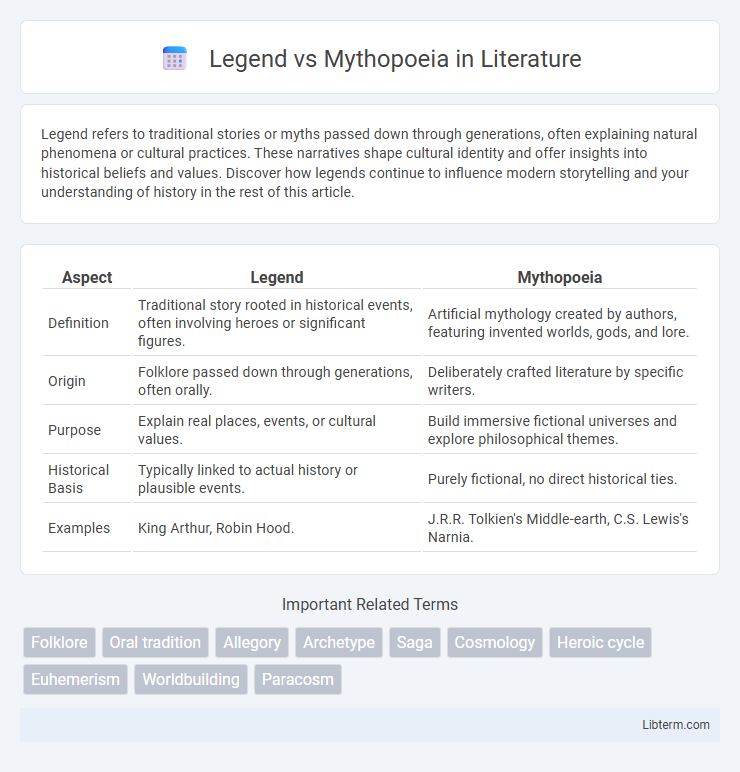Legend refers to traditional stories or myths passed down through generations, often explaining natural phenomena or cultural practices. These narratives shape cultural identity and offer insights into historical beliefs and values. Discover how legends continue to influence modern storytelling and your understanding of history in the rest of this article.
Table of Comparison
| Aspect | Legend | Mythopoeia |
|---|---|---|
| Definition | Traditional story rooted in historical events, often involving heroes or significant figures. | Artificial mythology created by authors, featuring invented worlds, gods, and lore. |
| Origin | Folklore passed down through generations, often orally. | Deliberately crafted literature by specific writers. |
| Purpose | Explain real places, events, or cultural values. | Build immersive fictional universes and explore philosophical themes. |
| Historical Basis | Typically linked to actual history or plausible events. | Purely fictional, no direct historical ties. |
| Examples | King Arthur, Robin Hood. | J.R.R. Tolkien's Middle-earth, C.S. Lewis's Narnia. |
Defining Legend: Origins and Characteristics
Legend originates from oral traditions and historical narratives that blend factual events with cultural symbolism, often centered around heroic figures or significant occurrences. Its defining characteristics include a strong connection to a specific place or community, a basis in plausibility, and the transmission of moral or cultural values through storytelling. Legends differ from myths by emphasizing historical context over supernatural explanation, reflecting the collective memory and identity of a society.
Exploring Mythopoeia: Creation and Purpose
Mythopoeia involves the deliberate creation of intricate mythologies and fictional universes, often reflecting cultural values, existential questions, and archetypal narratives. This art form extends beyond traditional legends by constructing original cosmogonies, deities, and heroic sagas, serving to enrich literature, gaming, and film with immersive world-building. Notable examples include J.R.R. Tolkien's Middle-earth and C.S. Lewis's Narnia, which exemplify how mythopoeia shapes collective imagination and narrative depth.
Key Differences Between Legend and Mythopoeia
Legends are traditional narratives rooted in historical events or figures, often grounded in reality but embellished with imaginative details, while mythopoeia refers to the deliberate creation of entirely new myths or mythological worlds by an author or culture. Legends typically evolve through oral tradition and aim to explain local customs or heroic deeds, whereas mythopoeia constructs complex, fictional universes with original gods, cosmologies, and lore. The key difference lies in legends' basis in perceived historical truth versus mythopoeia's foundation in creative invention for artistic or cultural expression.
Historical Contexts of Legends
Legends often emerge from historical contexts, blending factual events with cultural narratives passed through generations. Rooted in specific times and places, legends preserve communal memory by dramatizing historical figures or occurrences with symbolic significance. Unlike mythopoeia, which constructs entirely new mythologies, legends maintain a tangible connection to the past, reflecting societal values and collective experiences.
The Role of Mythopoeia in Literature
Mythopoeia plays a crucial role in literature by actively crafting entire mythologies that provide a foundational framework for fictional worlds, enriching narratives with symbolic depth and cultural resonance. Unlike legends that often reinterpret existing folklore, mythopoeic works generate original cosmogonies, deities, and epic histories, fostering immersive storytelling that explores universal themes through invented mythic systems. This creative process not only enhances world-building but also allows authors like J.R.R. Tolkien and C.S. Lewis to address complex philosophical questions within a mythic context.
Functions of Legends in Cultural Identity
Legends serve as vital vessels for preserving cultural identity by transmitting historical events and communal values through engaging storytelling. They embed collective memory and ethical lessons that reinforce social cohesion and cultural continuity across generations. By reflecting shared beliefs and social norms, legends foster a sense of belonging and distinctiveness within a community.
Mythopoeia and the Imagination of Worlds
Mythopoeia involves the deliberate creation of complex fictional universes, rich with original myths, languages, and histories, driven by the boundless imagination of worldbuilders. Unlike legends that evolve from cultural narratives rooted in reality or historical events, mythopoeic works construct entirely new cosmologies that reflect deep philosophical themes and archetypal motifs. This imaginative process expands literary horizons by blending myth with innovation, encouraging immersive storytelling that shapes collective cultural identities.
Notable Examples of Legends Across Cultures
Legends such as King Arthur from British folklore, the Japanese tale of Momotaro, and the West African story of Anansi the Spider showcase diverse cultural values and moral lessons. These narratives often blend historical elements with imaginative storytelling, preserving cultural identity and collective memory. The endurance of legends like these highlights their role in shaping societal beliefs and inspiring artistic expressions worldwide.
Influential Authors of Mythopoeic Works
J.R.R. Tolkien stands as the most influential author in mythopoeia, crafting an expansive legendarium with The Lord of the Rings and The Silmarillion, which blend intricate world-building with mythic narrative structures. C.S. Lewis contributed significantly through his Chronicles of Narnia series, intertwining Christian allegory with mythic elements to create accessible modern mythologies. Other notable authors include George MacDonald, considered a pioneer of modern fantasy, and Ursula K. Le Guin, whose Earthsea series redefines mythic storytelling with cultural depth and philosophical themes.
Enduring Impact: Legend vs Mythopoeia in Modern Storytelling
Legend and mythopoeia both shape modern storytelling by providing foundational cultural narratives and imaginative world-building; legends preserve historical and moral lessons rooted in real places and events, while mythopoeia crafts entirely new mythologies that explore universal themes through invented realities. The enduring impact of legends lies in their connection to collective memory and identity, reinforcing cultural values across generations. Mythopoeia's influence emerges in contemporary fantasy literature and media, where creative freedom enables exploration of complex ideas and immersive experiences beyond historical constraints.
Legend Infographic

 libterm.com
libterm.com